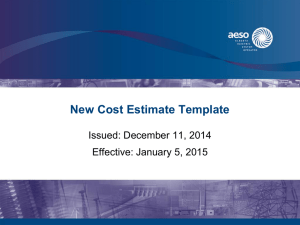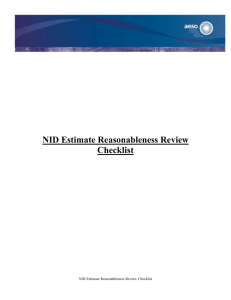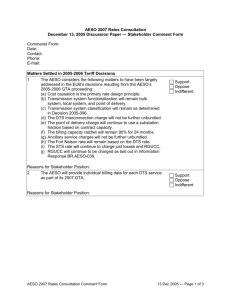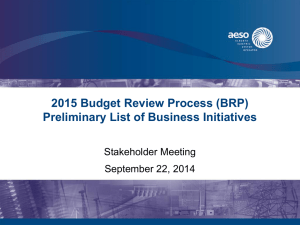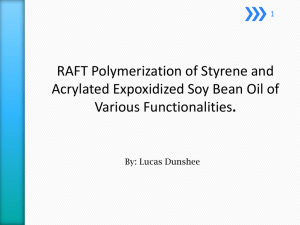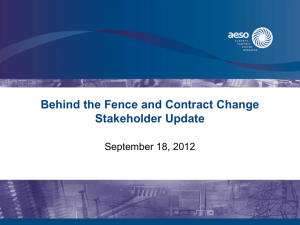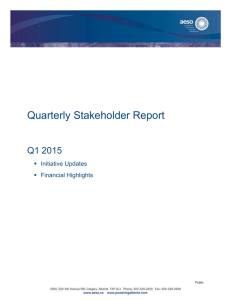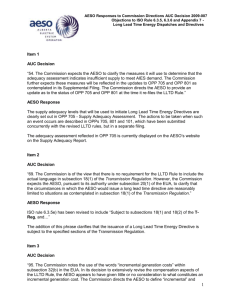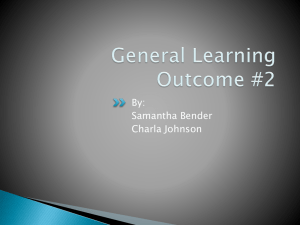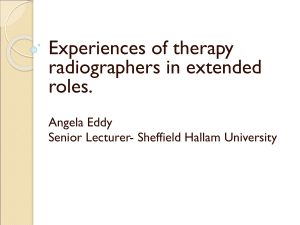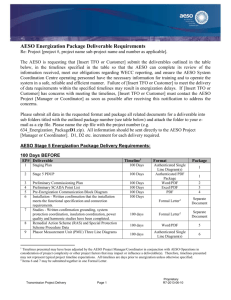AESO Market Participant Choice Stakeholder Presentation
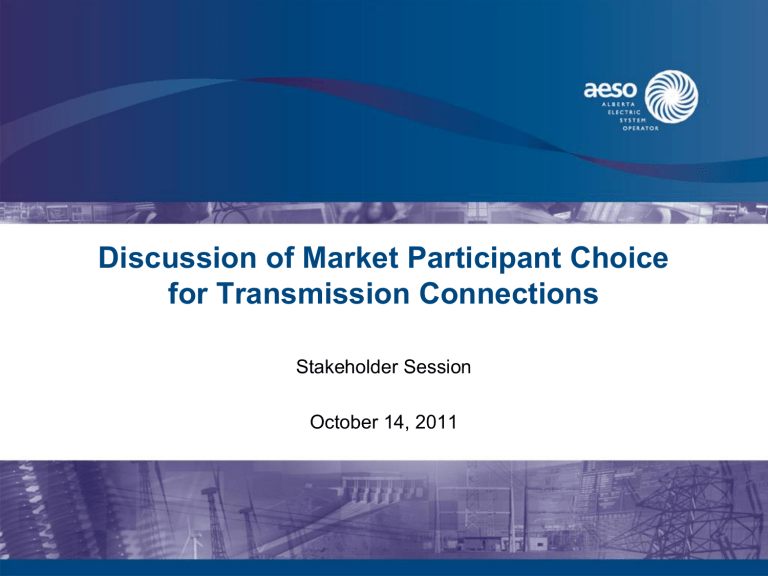
Discussion of Market Participant Choice for Transmission Connections
Stakeholder Session
October 14, 2011
Agenda
• Purpose
• Overview - what and why?
• Background
• AESO Connection Process
• Eligibility
• Own model
• TFO requirements and obligations
• Legislative framework
• Next steps
2
Purpose
• AESO issued a discussion paper September 29, 2011
– Sets out concepts for discussion on market participant choice
• Purpose of today’s session
– Present the concepts
– Provide additional clarification
– Identify next steps
– Facilitate discussion
– Respond to questions
3
Overview
What?
– The possibility of enabling a market participant who requests system access service to design, build, own and operate the transmission facilities dedicated to connecting its facilities to the AIES
– Market participant would become a transmission facility owner (TFO) in addition to taking system access service
Why?
– Some market participant concerns with cost & schedule for connections
– AESO supports practices that foster efficiencies and are in the public interest
Next Steps
– Requesting open discussion and written comments by October 31
4
Current Connection Example
• Incumbent TFO assigned the transmission line connection
5
Proposed Connection Example
• Participant owns transmission connection to the grid
• TFO facilities connection
6
Background
• Investigation
– Obtained input from functional areas within the AESO: project managers, planning, operations, standards, legal, etc.
– Sought input from market participants - TFOs, AUC, DOE & customer associations
– Legal review
• Considered several options
– Design, build, own and / or operate
• Initial determination
– “Own” model
– Transfer is an option between TFOs (AUC approval required)
– ISO Rule 9.1 may need to be revised (AUC approval required)
7
Current Process
• Participant files application for service (Stage 0)
• Incumbent TFO part of process, e.g. PPS (Stage 1 & 2)
• Project assigned to incumbent TFO (Stage 3)
8
Current Process - Authority
• Section 35(1)(a) of the EUA :
35(1) On receipt of Board approval of a needs identification document the Independent System Operator, in accordance with that approval, may
(a) direct the owner of a transmission facility to submit, for Board approval under the Hydro and Electric Energy Act, a transmission facility proposal to meet the need identified
• AESO assigns all participant connections to the incumbent
TFO during Stage 3 of the Connection Process
• Incumbent TFO prepares and files facility application
• Joint NID and Facility applications filed for some projects
9
Proposed Process
• Participant files application for service (Stage 0) and declares intention to be a TFO (accepts obligations & responsibilities)
• Incumbent TFO assists with connection (Stages 1 & 2)
• AESO requests “proposal” from participant (Stage 3)
10
Proposed Process - Authority
• Section 35(1)(b) of the EUA :
35(1) On receipt of Board approval of a needs identification document the Independent System Operator, in accordance with that approval, may
(b) request market participants to submit, for approval by the
Independent System Operator, a proposal to meet the need identified
• AESO asks participant for proposal
• If proposal is accepted by the AESO, participant files facility application
• Commission still approves NID and facility applications
11
Connection queue administration
• Market participant may changes its election part way after
Stage 0
• Connection project is cancelled and queue position revoked
• Market participant must submit a new system access service request and receive a new queue position
Eligibility - Participants
• The following are categories of Market Participants that connect directly to the AIES:
– Generators
– Loads
– Dual use
– Industrial system designations (ISD)
– Distribution facility owners (DFO)
• Which of these should be eligible to provide their own connections, and why or why not?
13
Eligibility – Connections
• The following are connection types that may be eligible:
– T-taps
– Switching stations
– In / Out arrangements
– Others?
• The following are connection types that are non-eligible:
– System lines
– System upgrades
– Connections serving multiple customers
14
Own Model
• Market Participant would assume responsibility for entire transmission asset life cycle
– Legal ownership of transmission facilities
– Design, construct, maintain, replace, upgrade, retire asset
– File a tariff
– Operate asset
– May be required to upgrade to allow other participants to use the asset
– Transfer of transmission facilities to another party after energization can occur provided all legal, legislative and regulatory requirements are met
• AESO can not initiate transfer of assets
15
TFO Requirements and Obligations
• TFOs (new and incumbent) are responsible to comply with requirements and obligations including:
– Electric Utilities Act (e.g. provide access)
– Hydro Electric and Energy Act (e.g. permit and license)
– Public Utilities Act
– Surface Rights Act (e.g. rights of way)
– Transmission Regulation
– Alberta Utilities Commission rules
– ISO Rules
– ISO Tariff
– Alberta Reliability Standards (e.g. all TFO related standards)
– Transmission TFO Terms and Conditions (e.g. agreements)
– TFO capital and operating cost recovery through Transmission Tariff applications to the AUC , as applicable
• TFOs (new and incumbent) are treated the same
• AESO may direct TFOs to undertake certain activities
16
Legislative Framework
• Market Participant Choice is supported by legislation:
– Electric Utilities Act, s. 35(1)(b) the AESO may “request market participant(s) to submit, for approval by the Independent
System Operator, a proposal to meet the need identified”
– Hydro and Electric Energy Act references not limited to TFOs but to “persons’’ in respect of transmission facilities
• Legislated obligations to make transmission facilities available include:
– Electric Utilities Act, s. 39(3)(e): each owner of a transmission facility must provide the AESO the use of such facilities
– Transmission Regulation, s. 28(3):generators may not prohibit access to the transmission interconnection facilities
17
AESO Rules
• Section 24(1) of the Transmission Regulation sets out assignment to incumbent TFOs based on service areas
– AESO Rule 9.1 codifies the T-Reg s. 24(1) assignments
• Section 24(2) of the Transmission Regulation allows for alternate arrangements
– Market Participant Choice could be an alternate arrangement
– AESO Rule 9.1 may need to be revised to allow for s. 24(2) arrangements
• Facility and NID applications could allow for compliance with section 24 of the Transmission Regulation
18
Next Steps
• Stakeholders provide written comments on the Discussion Paper
– Comments due October 28, 2011
• AESO posts stakeholder comments received
– November / December 2011
• AESO replies to stakeholder comments received
• Stakeholder information session held (if required)
• AESO prepares and posts a Recommendation Paper
• Stakeholder information session held (if required)
• Stakeholders provide written comments on the Recommendation Paper
• Implementation
– May include items such as:
• ISO rules changes, as required
• Connection process changes, as required
19
